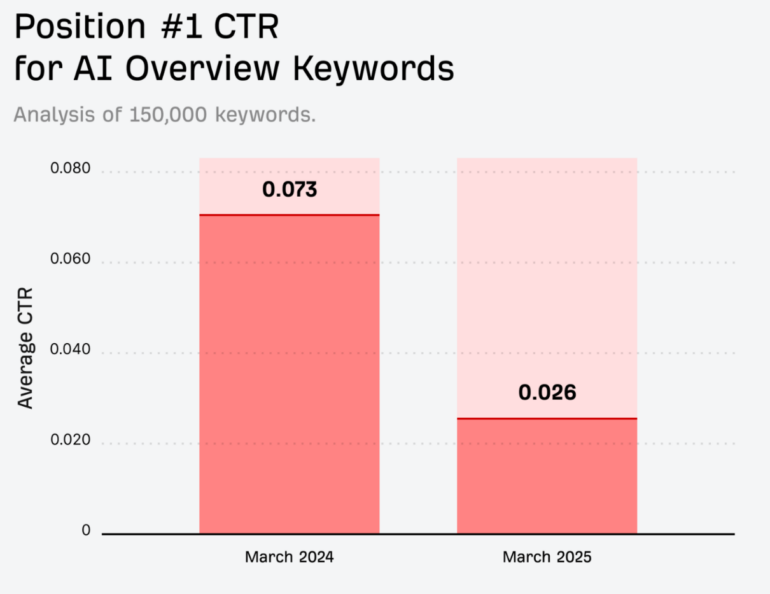New analysis from Ahrefs shows Google’s "AI Overviews" are driving down clicks to top-ranked websites by over 34%, directly contradicting Google’s own claims.
A recent analysis from Ahrefs suggests that Google’s AI Overviews are significantly reducing traffic to top-ranking websites. According to the study, the click-through rate (CTR) for the first organic result has dropped by 34.5% since the feature was introduced—challenging Google's assertions that generative AI helps users engage more with web content.
The study compared 300,000 search queries—specifically focusing on 150,000 keywords both with and without AI Overviews. Nearly all of these terms were informational, which tracks with Ahrefs’ observation that 99.2% of AI Overview-triggered searches are in this category. The data was sourced directly from Google Search Console.
 The introduction of AI Overviews in the US led to a dramatic decline in the click-through rate for the top search result. | Image: Ahrefs
The introduction of AI Overviews in the US led to a dramatic decline in the click-through rate for the top search result. | Image: AhrefsIn March 2024—just before the U.S. release of AI Overviews—the average desktop CTR for the first search result was 0.073. One year later, that number had dropped to 0.026. According to Ahrefs’ estimates, the expected CTR without AI Overviews would have been roughly 0.040. This results in a 34.5% decline in visibility for the top organic listing.
Ad
THE DECODER Newsletter
The most important AI news straight to your inbox.
✓ Weekly
✓ Free
✓ Cancel at any time
Early data debunks Google's claims of increased click-through rates
Google executives have previously argued that AI-powered answers might actually boost click rates, a claim that sounded far-fetched even then. Now, Ahrefs’ data puts that idea to rest, and other studies have reached similar—sometimes even more dramatic—conclusions. Ryan Law, Ahrefs’ Content Marketing Director, predicts that click rates will only continue to slide.
Meanwhile, Google is already experimenting with an even more aggressive redesign dubbed "AI Mode." Rather than showing classic search results, the interface would direct users into a dialog-driven back-and-forth with AI-generated answers.
Other companies—including OpenAI and Perplexity—are also pushing models that pull information directly from the web and generate answers on the fly.
If this new model of AI-mediated search wins out, it would fundamentally change the nature of the open internet. Websites wouldn’t just lose visibility—they’d lose direct contact with users altogether. The major tech and AI players would become the primary gatekeepers of information, setting the terms for what gets shown, cited, or ignored.
For publishers and content creators, the implications are stark: to reach an audience at all, they’d have to bend to the platforms’ rules. The data and articles that power AI systems are losing value in the open ecosystem—even as closed AI platforms reap the rewards of reusing that content behind their own walls. The web’s original vision as a network of interlinked, accessible content is under mounting pressure.
Recommendation

 2 hours ago
2
2 hours ago
2



